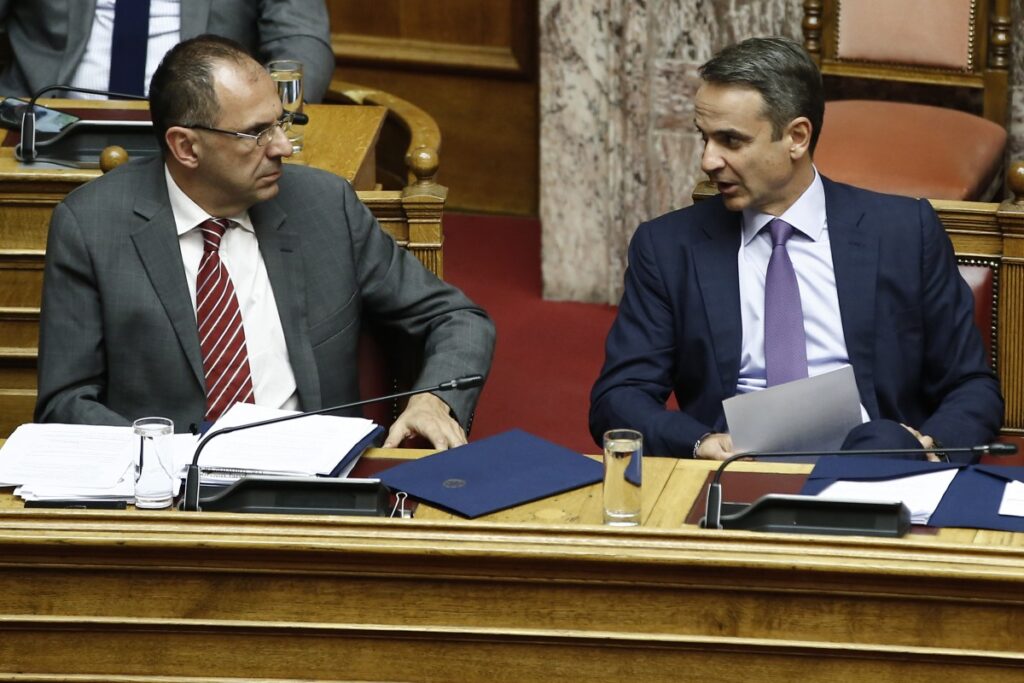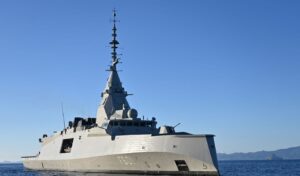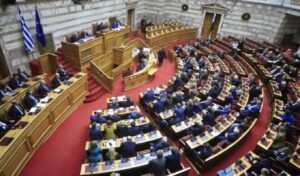This is undoubtedly the most critical session of the UN General Assembly in recent years (starting today), with open war fronts, serious crises in international relations, and a planet leader who has confused the world with his ambiguous positions on serious and less serious interstate issues. Within this environment, the Greek diplomatic mission, led by Prime Minister Kyriakos Mitsotakis and Foreign Minister Giorgos Gerapetritis, approaches the annual session of the Organization as tightrope walkers.
They face Turkey’s chronically expansionist policy, now called “Blue Homeland” by a President, Recep Tayyip Erdogan, who moves with flexibility on the global chessboard. Tomorrow is considered the most critical day of the week. Prime Minister Kyriakos Mitsotakis will meet after almost a year with Turkish President Recep Tayyip Erdogan (the meeting in The Hague in June was ceremonial) in what Giorgos Gerapetritis characterized as a “substantial meeting,” and is expected to put all bilateral issues on the table.
Little room for optimism ahead of Mitsotakis-Erdogan and Gerapetritis-Fidan meetings
Diplomatic sources estimate that the deterioration of the climate in recent times in our relations with Turkey does not leave much room for optimism regarding the outcome of the meeting between the two leaders. On the contrary, we may see further escalation of the situation, depending on the stance taken on contentious issues. Certainly the biggest “thorn” in Greek-Turkish relations is the competition of interests between the two countries in the Mediterranean. Turkey seeks by all means to impose its aspirations, ignoring International Law and rejecting the International Law of the Sea. It invokes the boundaries of the “Blue Homeland” and even the “legally invalid and unfounded” Turkish-Libyan memorandum, enlists Libya and Egypt, attempting to geographically isolate Greece and becomes furious with Chevron’s presence in territorial waters.
This stance is expected to be raised in talks both between Mitsotakis-Erdogan and between Gerapetritis-Fidan. Mainly because Turkey attempted to impose its aspirations in the field as well, twice obstructing the laying of the electrical interconnection cable between Crete-Cyprus-Israel and once the EU-Saudi Arabia fiber optic cable. Even the recent deployment of “Piri Reis” in the Aegean is interpreted by experienced analysts as Ankara’s attempt to signal that it will not allow any project in the Eastern Mediterranean without its approval.
Greece’s declared position that it will not accept any retreat from its sovereign rights is expected to be heard again in this meeting between the two leaders, especially since Turkey with the maps it published for the Continental Shelf (16/6/2025) and Marine Parks (2/8/2025) clearly violated potential Greek EEZ and continental shelf. The dominant issue in Tuesday’s meeting is expected to cause tension between the two leaders and concerns Greece’s request for Turkey to lift the casus belli, which has been set as a condition for Turkey’s inclusion in the EU’s “Safe” defense funding program. Greece’s linking of these two issues has often infuriated Turkey, as shown by statements from Defense Minister Yasar Guler. The outcome of negotiations on this issue may constitute the beginning of a new cycle of confrontation with the neighboring country.
According to analysts, Ankara regularly raises the issue of protecting the Muslim minority in our country in Greek-Turkish meetings, as it insists on calling it “Turkish.” It is doubtful, however, whether the two leaders will spare time for this issue, since crucial matters requiring resolution have emerged. The future of the Athens Declaration will depend on the climate created between the two leaders, as will the scheduling of the Supreme Cooperation Council meeting that has been postponed since last January. However, the stance that the American President will maintain on Greek-Turkish issues after his meeting with the Turkish President is expected to play a catalytic role, and whether Donald Trump will reveal his cards regarding his aspirations in the Eastern Mediterranean.




